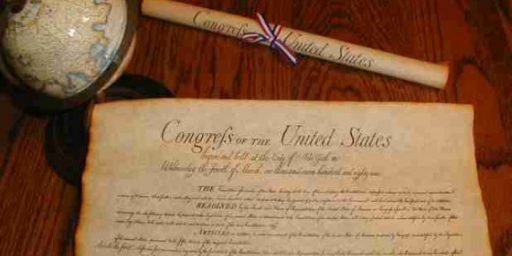Colorado Judge Defers Trial Of Fox News Reporter
A Colorado Judge has deferred ruling on whether or not Fox News reporter Jana Winter should be compelled to the reveal the source of information she received while reporting on the Aurora theater shootings case and the mental state of suspect James Holmes:
A Fox News reporter who could face jail time if she refuses to testify about her sources in the Aurora theater shooting case has won a reprieve.
Judge Carlos A. Samour Jr. ruled Monday that he won’t decide whether to order reporter Jana Winter to testify until he first decides whether the key clue in the case she was to testify about will be allowed as evidence. In doing so, Samour sided with an argument by Winter’s lawyers that the testimony issue isn’t “ripe” for ruling.
“The Court is not comfortable proceeding on an incomplete record,” Samour wrote in his order Monday. “As soon as the record is adequate, the Court will move forward.”
Samour was to decide during a hearing Wednesday whether to order Winter to testify, and he said at a hearing last weekthat she faced up to six months in jail if she refused to speak. The Wednesday hearing will go on, Samour said, but he will not make a final decision on the issue.
That means Winter may still have to make what Samour referred to in the earlier hearing as a “Hobson’s choice” between preserving her career or staying out of jail. Winter has said that if she discloses her sources, it would violate her source’s trust and ruin her ability to gather news.
(…)
As long as the notebook is sealed, Samour ruled the issue isn’t important enough to the case to overcome the protections Winter has against revealing her sources.
“If the notebook is not privileged and is ruled admissible, it may well prove to be a critical piece of evidence in the case,” Samour wrote in his order. “On the other hand, if the Court concludes that the notebook is privileged and inadmissible, it is difficult to discern why the credibility of one or more of the … witnesses would be of importance.”
Colorado’s shield law gives reporters strong protection against having to divulge their sources, said attorney Steven Zansberg, who has represented several new outlets, including The Denver Post and Fox News, on other issues in the theater shooting case. To overcome that protection, lawyers seeking to put a reporter on the stand must show that the information they want is centrally important to the case, that their interest in getting it outweighs the reporter’s First Amendment rights in protecting it and that they can’t get the information any other way.
“It is extremely unusual,” Zansberg said, especially since the issue here is tangential to the case.
Of course, if Holmes does go forward with a legal insanity defense, then the information contained in that notebook would become highly relevant to the case and, indeed, would likely be something his attorneys would want to introduce at trial. Additionally, if he does raise a mental health defense then it’s generally the rule that the law will deem him to have waived any doctor-patient privilege, although I can’t say for sure what the law on this issue is in Colorado. In other case, though, I’m somewhat at a loss to understand what relevance the identity of whoever leaked the contents of the notebook to Winter has to any of the central issues in the case.
So, it’s a reprieve for Winter for now, but still only a temporary one.






It’s sort of Bizarro Land reading media articles about shield law disputes. Therein the bias and the agenda are not political, as normally they are, but instead automatically will be in favor of the shield law and the salient reporter not having to divulge his or her sources, even when said reporter works for “the enemy,” so to speak.
This part of the article speaks volumes, in terms of how it’s phrased:
The other way to have written that part of that graf would have been as follows:
Eyes of the beholder, and such.
This is why I don’t understand the need to divulge her source. What does it matter where her info came from? They have already admitted to the veracity of it. Do they think her source might have more info? If so, what kind of info? As far as I can tell, it is in all likelihood a mail room clerk. (or did I miss something?)
@Tsar Nicholas:
Where in Gawd’s name did you learn to write?
@OzarkHillbilly: Yup, you missed something. In the linked article, it’s stated that Winter’s sources were two people in law enforcement. The reason their identity is an issue is because a gag order had been issued, and the defense wants the judge to sanction the leakers.
There ya go, you don’t even have to make the effort of reading the article before you comment on it. You’re welcome. 🙂
@Boyd:
The issue of sanctioning the leakers, however, is not exactly relevant to any of the issues in the underlying criminal trial.
Colorado’s journalist shield law only allows judges to compel reporters to testify in these circumstances if there is a “compelling state interest” in favor of doing so. I’m not sure I see the compelling interest here.
@Doug Mataconis: I was merely paraphrasing the information in the article that OH hadn’t bothered to read.
That being said, one could argue there’s a “compelling state interest” in sanctioning people who violated the judge’s gag order. I’m not sure I agree with it, but there appears to be a legitimate argument to be made on that point.
A side issue, possibly, but didn’t Holmes’s psychiatrist already violate doctor/patient privilege when she turned the notebook over to the police?
It
Isn’t the issue his 14th amendment rights being that the information released by the reporter is highly prejudicial and now widely known tainting any potential jury pool thus depriving him of a fair trial vs her 1st amendment rights? A case that springs to mind is Shaw v. DPP [1982] IR 1. Shaw was a suspected serial killer who was being held for being in possession of a stolen vehicle but being questioned about the disappearance of a woman. Police believing the woman to still be alive but being held somewhere questioned him long after they were law bound to release him. It turns out she was already dead. Shaw appealed his conviction on the grounds that the police had deprived him of his constitutional right to due process for not releasing him, the DPP (irish gov prosecutor) argued that the police believed this woman to be alive but being held against her will and of they didn’t find her she would die so taking a hierarchal view of the constitution her right to life outweighed his right to due process, so i ask here what do you think does his 14th amendment rights outweigh her 1st amendment rights under a hierarchal constitutional interpretation ?